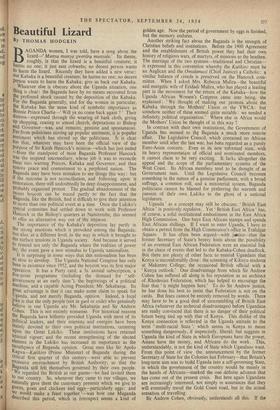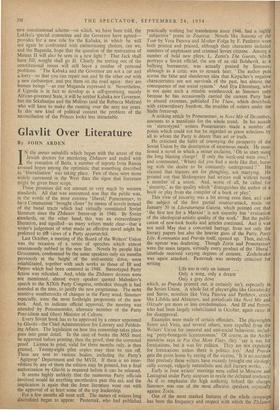Beautiful Lizard
Y THOMAS HODGKIN AGANDA women, I was 'told, have a song about the lizard—'Munya munya gweriira munyale.' Its theme.
roughly, is that the lizard is a beautiful creature; it harms no one; it just eats cobwebs; no decent person wants to harm the lizard. Recently they have added a new verse:
our Kabaka is a beautiful creature; he harms no one; no decent Person wants to harm the Kabaka; give us back our Kabaka. .' Whatever else is obscure about the Uganda situation, one thing is clear: the Baganda have by no means recovered from the profound shock caused by the deposition of the Kabaka. For the Baganda generally, and for the women in particular, the Kabaka has the same kind of symbolic importance as Bonnie Prince Charlie= Will ye no come back again ? ' Their distress—expressed through the wearing of bark cloth, giving 111) shopping, ceasing to attend church, deputations to Bishop and Governor—was, and remains, genuine and spontaneous. Far from politicians stirring up popular sentiment, it is popular sentiment which has stirred up the politicians. It is clear too that, whatever may have been the official view of the purpose of Sir Keith Hancock's mission—which has just ended —from the standpoint of most Baganda Professor Hancock was the inspired intermediary, whose job it was to reconcile these two warring Princes, Kabaka and Governor, and thus restore peace and contentment to a perplexed nation. The Baganda may have been mistaken to see things this way : but if the outcome is not reconciliation, and following upon it restoration, there will undoubtedly be deep disappointment, and Probably organised protest. The gradual abandonment of the recent boycott can be traced partly to the fact that the Baganda, like the British, find it difficult to give their attention to more than one political event at a time. Once the Lukiko's special committee had settled down to work with Professor Hancock in the Bishop's quarters at Namirembe, this seemed to offer an alternative way out of the impasse.
The importance of the Kabaka's deposition lay partly in the strong emotions which it provoked among the Baganda; but also, at a different level, in the way in which it brought to the surface tensions in Uganda society. And because it served to remind not only the Baganda where the realities of power lay, the event gave .a new stimulus to Uganda nationalism. It is surprising in some ways that this nationalism has been so slow to develop. The Uganda National Congress has only been in existence since 1952, and the boycott was its first major operation. It has a Party card, a 3s. annual subscription, a five-point programme (including the demand for self- government at an early date '), the beginnings of a political rnathine, and a capable Acting President, Mr. Sekabanja. Its great advantage is that it can make some claim to speak for Uganda, and not merely Buganda, opinion. Indeed, h lochl
Loke is that the only people (not in gaol or exile) who genuinely elieve in one Uganda are Mr. Sekabanja and Sir Andrew Cohen. This is not entirely nonsense. For historical reasons the Baganda have hitherto provided Uganda with most of its Political leaders, and their interests and energies have been mainly devoted to their own political institutions, centering Upon the Great Lukiko. These institutions have retained Unusual vigour; and the recent strengthening of the elected element in the Lukiko has increased its importance as the Mouthpiece of Buganda opinion. Great men like Sir Apolo Xagwa—Katikiro (Prime Minister) of Buganda during the critical first quarter of this century—were able to prevent excessive encroachment by British Authority; so that the Baganda still felt themselves governed by their own people.
We regarded the British as our guests—we had invited them to our country. So, whenever they came to our villages, we naturally gave them the customary presents which we give to guests, goats and chickens and eggs—particularly eggs : and we would make a feast together '—was how one Muganda described this period, which in retrospect seems a kind of golden age. Now the period of government by eggs is finished, but the memory endures.
Another striking fact about the Baganda is the strength of Christian beliefs and institutions. Before the 1900 Agreement and the establishment of British power they had their own history of religious wars, of martyrs, of missions to the heathen. The marriage of the two systems—traditional and Christian— is expressed in this convention whereby the Katikiro must be an Anglican and the,Omulamuzi (Chief Justice) a Catholic: a similar balance of creeds is preserved on the Hancock com- mittee. When I asked Mrs. Rebecca Mulira—the beautiful and energetic wife of Eridadi Mulira, who has played a leading part in the movement for the return of the Kabaka—how the Uganda African Women's Congress came into being, she explained: ' We thought of making our protests about the Kabaka through the Mothers' Union or the YWCA : but somehow neither of these seemed quite suitable: we needed a definitely political organisation.' Where else in Africa would the Mothers' Union be thought of in this way ?
In contrast with their own institutions, the Government of Uganda has seemed to thg Baganda a much more remote affair. The Legislative Council, which contained no African member until after the last war, has been regarded as a purely Euro-Asian concern. Even in. its new reformed state, with its heavy representatipn of official and nominated members. it cannot claim to be very exciting. It lacks altogether the appeal and the scope of the parliamentary systems of the West Coast. Its African members tend to be thought of as Government men. Until the Legislative Council becomes something in the nature of a genuine parliament, with a broad suffrage, a common roll, and a ministerial system, Baganda politicians cannot be blamed for preferring the warmth and passion of their own Lukiko to the ghost of a national legislature.
Uganda' as a concept may still be obscure; ' British East Africa' is positively repulsive. Yet British East Africa' has, of course, a solid institutional embodiment in the East Africa High Commission. One buys East African stamps and spends East African shillings. If I want to enter Uganda, I have to obtain a permit from the High Commission's office in Trafalgar Square. It has often been argued—with justice—that the former Secretary of State's breezy hints about the possibility of an eventual East African Federation were an essential link in the chain of events that led to the Kabaka-Cohen deadlock. But there are plenty of other facts to remind Ugandans that Kenya is uncomfortably close: the screening of Kikuyu students at Makerere College; the occasional British official with a Kenya outlook.' One disadvantage from which Sir Andrew Cohen has suffered all along is his reputation as an architect of ,Rhodesian Federation, which has helped to encourage the fear that it might happen here.' To do Sir Andrew justice, he has done his best to insist that Federation is not on the cards. But fears cannot be entirely removed by words. There may have to be a good deal of unscrambling of British East Africa (whatever the technical disadvantages) before Ugandans are really convinced that there is no danger of their political future being tied up with that of Kenya. This dislike of the Kenya connection is reflected in the Uganda attitude to the term multi-racial State '; which seems in Kenya to mean something dangerously, if imprecisely, liberal; but suggests in Uganda the kind of State in which Europeans have the power, Asians have the money, and Africans do the work. This, understandably, is not the kind of State which Ugandans want. From this point of view the announcement by the former Secretary of State for the Colonies last February—that Britain's long-term aim was to build Uganda into a self-governing State. in which the govetnment of the country would be mainly in the hands of Africans—marked the one definite advance that has come out of the present crisis. But here again Ugandans are increasingly interested, not simply in assurances that they will eventually travel the Gold Coast road, but in the actual sensation of travelling.
Sir Andrew Cohen, obviously, understands all this. If the -new constitutional scheme—on which, we have been told, the .Lukiko's special committee and the Governor have agreed— provides for a new role for the Kabaka, in which he will not again be confronted with embarrassing choices, can we, and the Baganda, hope that the question of the restoration of Mutesa II will also be seen in a new light ? That Jack shall have Jill: nought shall go ill. Clearly the sorting out of the constitutional issues will still leave a residue of personal problems. The Kabaka and the Governor are not a car and a-lorry—so that you can repair one and fit the other out with a new carburettor, and put them on the road again: they are human beings '—as one Muganda expressed it. Nevertheless, if Uganda is in fact to develop as a self-governing, mainly African-governed State, it will be neither Kabaka nor Governor, but the Sekabanjas and the Muliras (and the Rebecca Muliras) who will have to make the running over the next ten years. In this new kind of political context the problem of the reconciliation of the Princes looks less intractable.



































 Previous page
Previous page